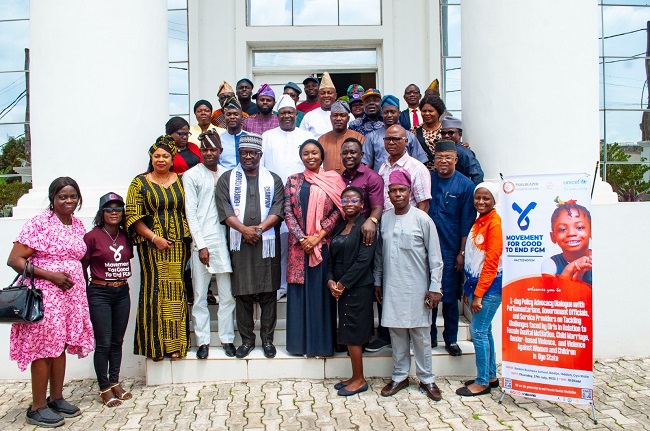Stakeholders and medical experts have identified low reportage and non-prosecution of offenders as major factors encouraging Female Genital Mutilation (FGM) in Nigeria.
They tasked both the legislative and executive arms of government with effective legislation and effective prosecution of offenders as parts of the measures to stem the tide of FGM in the country with a view to meeting the target of zero FGM by the year 2030.
Speaking in Ibadan, Oyo State capital, during a one-day seminar organised for members of the Oyo State House of Assembly, on challenges against the implementation of FGM laws, the executive director of Trailblazer Initiative Nigeria, a non-profit organisation, Dr Dare Adegoke-Adaramoye, lamented that “minimal reportage and failure to prosecute offenders are promoting FGM cases.”
The seminar, which was organised in collaboration with the United Nations International Children’s Emergency Fund (UNICEF) was to advocate for parliamentary intervention to save millions of girls and women in Nigeria who are at risk and living with the lifelong consequence of female genital mutilation.
Olagoke-Adaramoye noted that the 2018 Nigeria Demographic Health Survey (NDHS) revealed that “the national prevalence of FGM among women aged 15-49 was 20%, while it was 31.1% in Oyo. Similarly, the National FGM Prevalence amongst 0-14 years was 19.2%, while it was 8.2% in Oyo State.
He added that “preliminary findings from the baseline situation assessment on FGM Knowledge, Attitude, and Practice (KAP) study, which was conducted prior to the start of the UNIFPA/UNICEF joint programme on the elimination of FGM in Oyo State in 2015, indicated that Kajola Local Government had a 98% prevalence of FGM, while Ibarapa North had an 89.3% prevalence among women aged 15-49 years.”
Olagoke-Adaramoye contended that despite the 2020 domestication of the Violence Against Persons (Prohibition) law, by the Oyo State government, in addition to two other laws that previously existed in the state, unfortunately, there has been low reportage of cases and zero prosecution.
In her keynote address, the UNICEF Child Protection Specialist (harmful practices) – Mrs. Hadiza Ibrahim Abba, hinted that Nigeria currently ranks third globally in terms of absolute numbers of girls and women (appx. 19.9 million) who have undergone FGM.
To put this into perspective, she affirmed that, by the end of our conservation today, about 106 girls in Nigeria would have undergone one of the severest forms of violations of their rights – the mutilation of their female genitalia for non-medical reasons.
READ ALSO FROM NIGERIAN TRIBUNE
WATCH TOP VIDEOS FROM NIGERIAN TRIBUNE TV
- Let’s Talk About SELF-AWARENESS
- Is Your Confidence Mistaken for Pride? Let’s talk about it
- Is Etiquette About Perfection…Or Just Not Being Rude?
- Top Psychologist Reveal 3 Signs You’re Struggling With Imposter Syndrome
- Do You Pick Up Work-Related Calls at Midnight or Never? Let’s Talk About Boundaries







